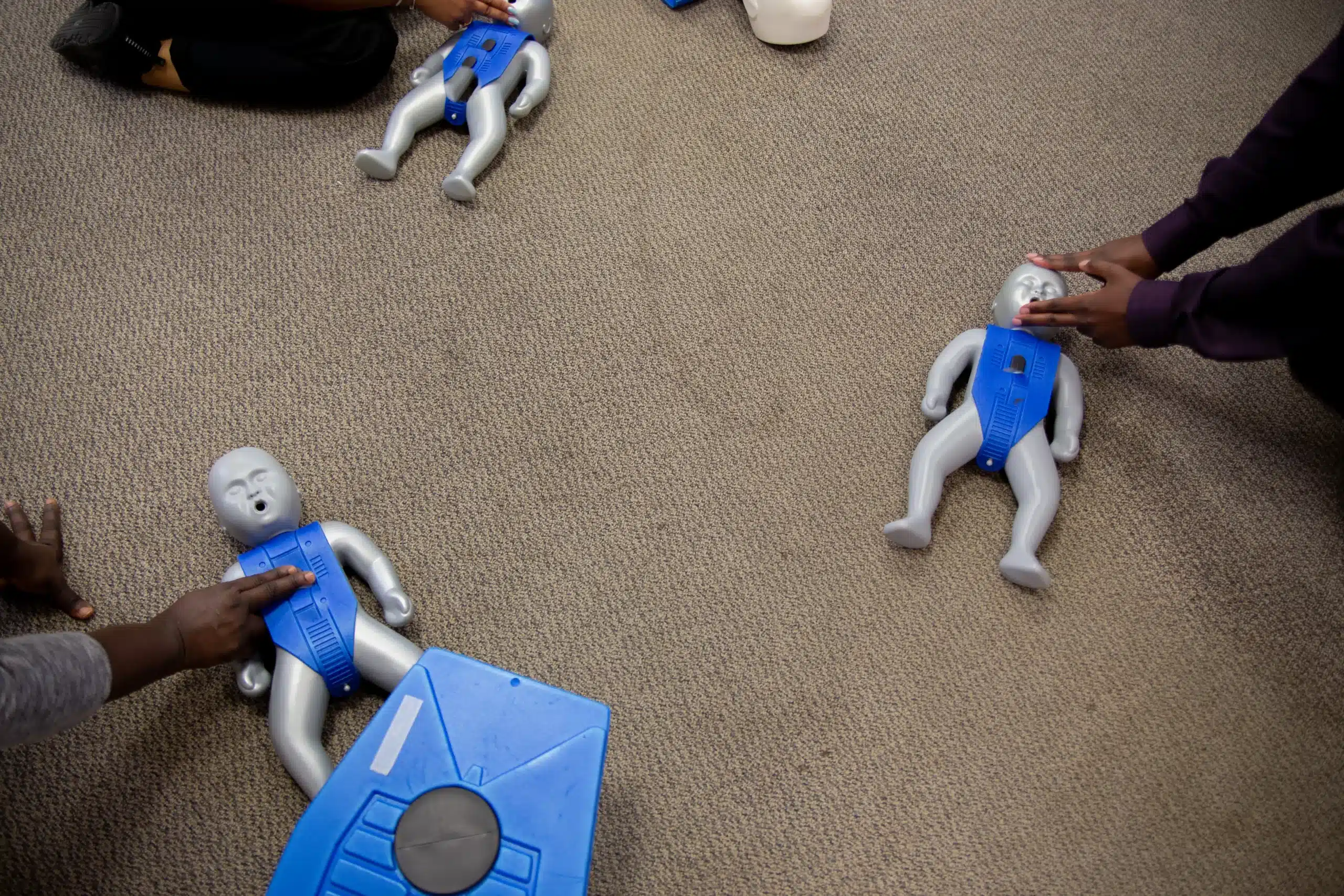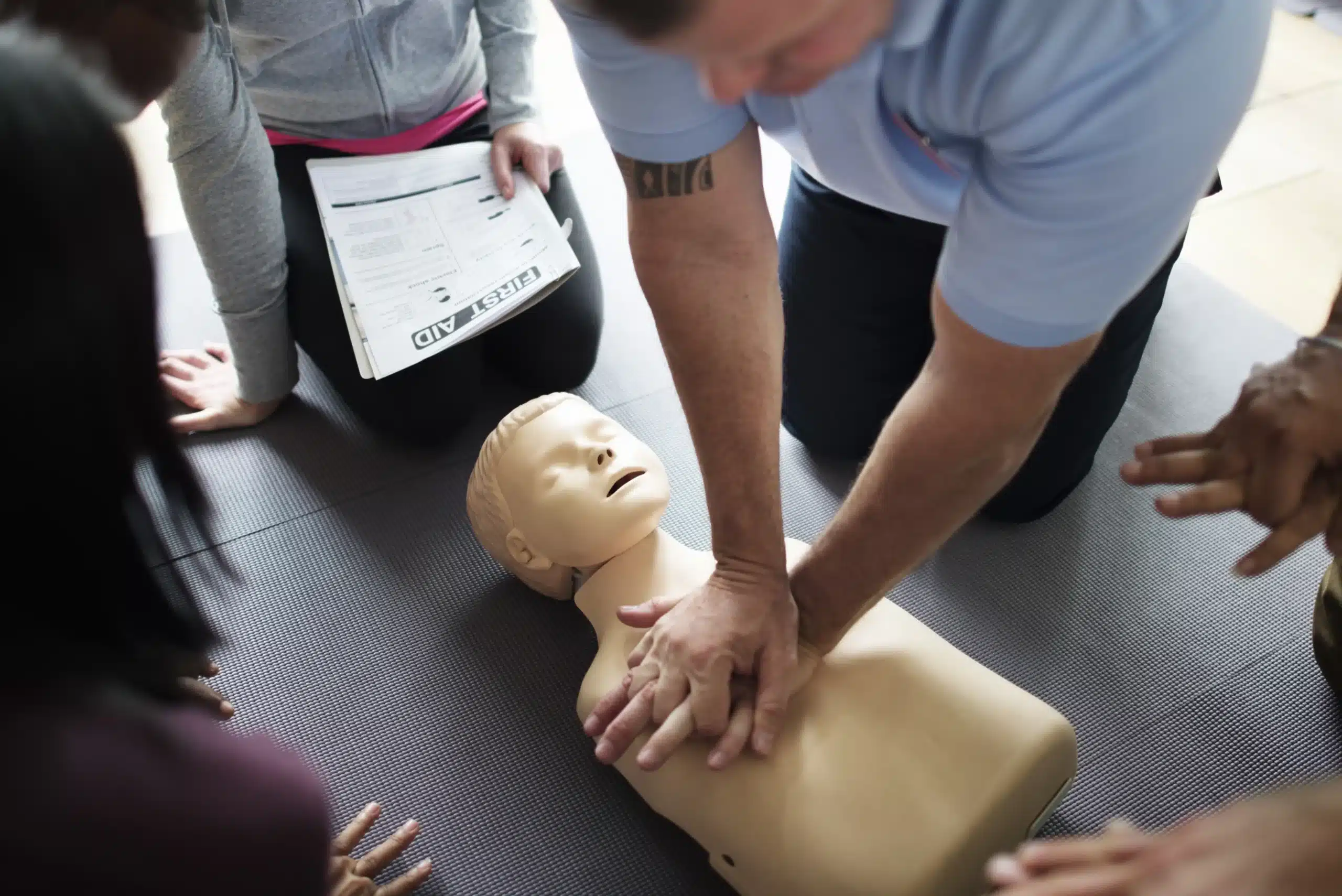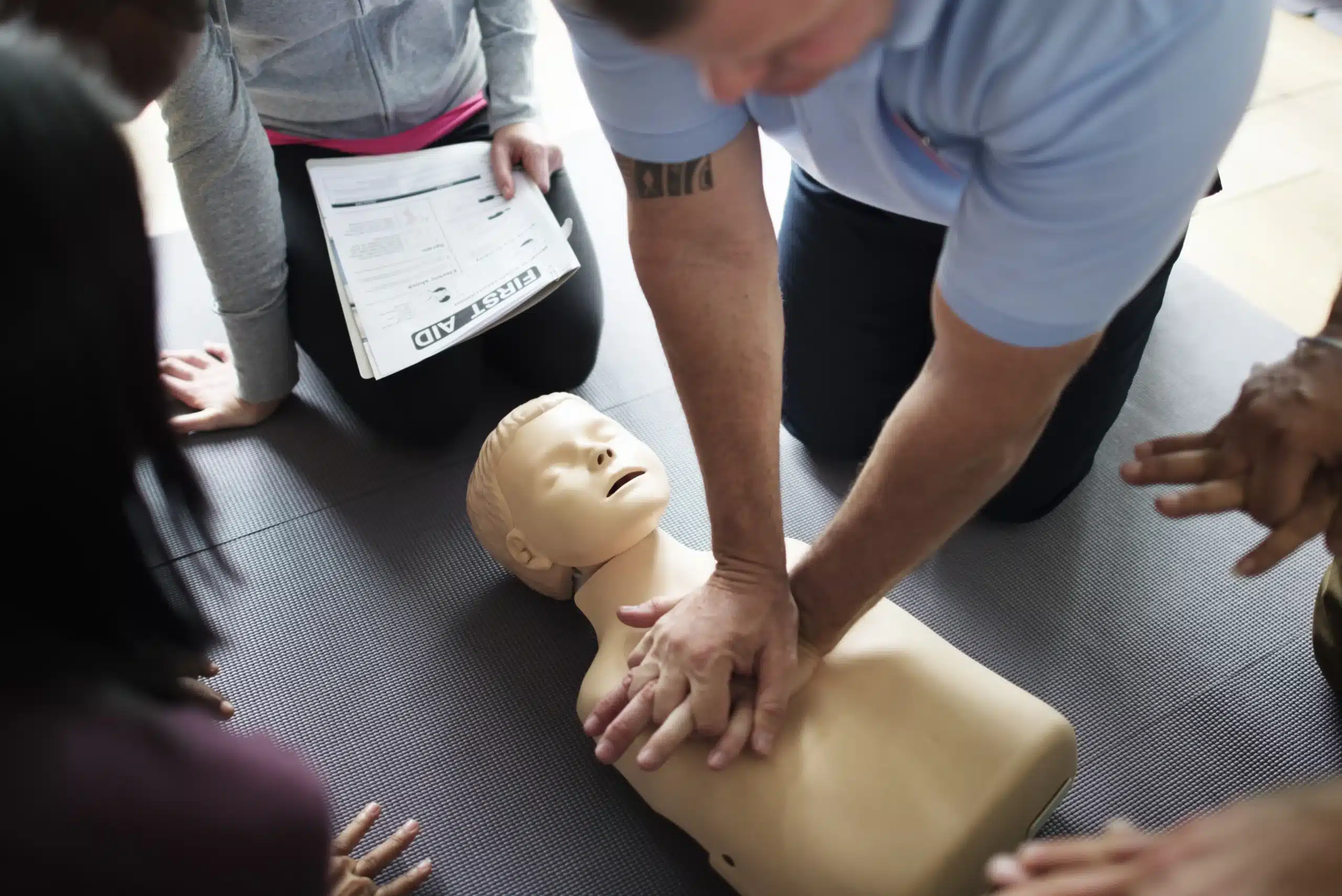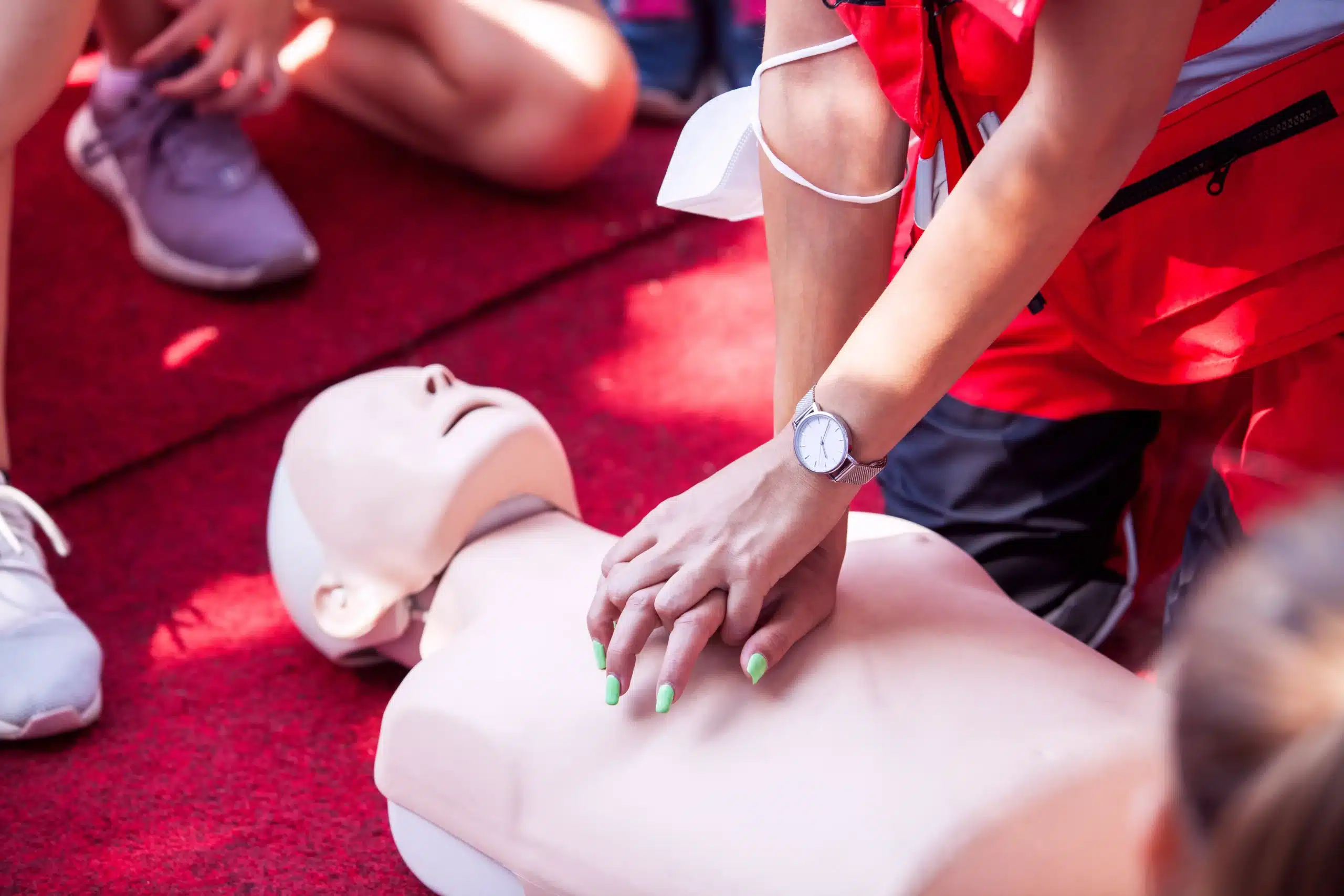Every second counts in a pediatric emergency. As a healthcare provider, you’re on the front lines, and having the right training can significantly impact a child’s outcome. Pediatric Advanced Life Support (PALS) certification goes beyond basic life support, providing the specialized knowledge and practical skills needed to confidently manage critical situations involving infants and children. This article explores the importance of pediatric advanced life support in Palo Alto and surrounding areas, outlining what PALS training entails, who benefits from it, and how it can enhance your career in pediatric care. We’ll also discuss where to find PALS courses near you, including options for blended learning and convenient scheduling.
Key Takeaways
- PALS certification equips you with essential skills for pediatric emergencies: This specialized training provides the knowledge and practical skills needed to effectively assess, manage, and treat critically ill infants and children, leading to improved patient outcomes.
- PALS courses offer a flexible, blended learning experience: Combining online modules with in-person skills sessions and simulations allows you to learn at your own pace and gain hands-on experience in a supportive environment.
- Maintaining your PALS certification demonstrates your commitment to excellence: Staying up-to-date with the latest guidelines through renewal courses and continuing education ensures you provide the highest quality care throughout your career.
What is Pediatric Advanced Life Support (PALS)?
Pediatric Advanced Life Support (PALS) is a specialized program designed to equip healthcare providers with the knowledge and skills to effectively manage critically ill infants and children. A PALS Certification demonstrates a provider’s commitment to high-quality care during pediatric emergencies. It’s a vital credential for any healthcare professional working with young patients.
Definition and Significance
PALS focuses on the systematic approach to pediatric assessment, treatment, and stabilization. This specialized training goes beyond basic life support, covering the complexities of pediatric physiology and the specific interventions needed for serious childhood illnesses and injuries. PALS training is essential for professionals in emergency departments, intensive care units—really any setting where children might experience a medical crisis. The value of PALS lies in its potential to dramatically improve outcomes for critically ill children.
Key Components of PALS Training
PALS courses cover a range of topics crucial for effective pediatric emergency care. Airway management is a central focus, teaching providers how to secure and maintain open airways in children. The program also emphasizes a step-by-step process for managing pediatric cardiac arrests, including high-quality CPR, defibrillation protocols tailored to children, and the administration of medications. Through this comprehensive training, PALS ensures providers have the skills and confidence to handle various pediatric emergencies.
Who Needs PALS Certification?
Knowing how to respond to a pediatric emergency can be life-saving. Pediatric Advanced Life Support (PALS) certification gives healthcare providers the skills to manage these critical situations. But who really benefits from this specialized training? Let’s take a look.
Healthcare Professionals Who Benefit
PALS certification is essential for any healthcare professional who works with infants and children. This includes professionals in emergency rooms, intensive care units, and other critical care settings. Doctors, nurses, paramedics, respiratory therapists, and EMTs all benefit from PALS training. Even professionals not directly involved in hands-on care, such as physician assistants and pharmacists in pediatric settings, can gain valuable insights from understanding PALS principles. A team trained in PALS ensures everyone is prepared and can contribute during a pediatric emergency.
Importance of PALS in Pediatric Emergency Care
PALS training goes beyond basic life support. It provides specialized knowledge and skills tailored to the distinct needs of infants and children. PALS courses cover topics like airway management, CPR techniques, and medication dosages specific to pediatric patients. This comprehensive training helps professionals quickly assess a child’s condition, make informed decisions under pressure, and provide the best possible care. PALS certification contributes to better patient outcomes and increases the chances of survival in pediatric emergencies. It empowers healthcare providers to confidently handle critical situations and deliver high-quality care, making a real difference.
What Do You Learn in a PALS Course?
A Pediatric Advanced Life Support (PALS) course equips healthcare providers with the knowledge and skills to manage pediatric emergencies. From assessment techniques to team communication, the curriculum covers a range of essential topics. Let’s explore the key areas you’ll focus on during your PALS training.
Assessment and Management Techniques
PALS teaches a systematic approach to assessing and managing pediatric emergencies. You’ll learn how to quickly evaluate a child’s condition, identify the underlying cause, and implement appropriate interventions. This includes mastering airway management techniques specific to infants and children, a crucial skill in many emergencies. PALS training emphasizes a step-by-step approach to managing pediatric cardiac arrests, including high-quality CPR, defibrillation, and administering medications tailored to young patients. Effective airway management is a cornerstone of PALS.
Advanced CPR for Children and Infants
CPR is a cornerstone of emergency care, and PALS courses cover advanced CPR techniques specifically for children and infants. You’ll learn how to perform chest compressions and rescue breaths, considering the anatomical differences between pediatric and adult patients. This specialized training ensures you can provide effective CPR in a pediatric emergency. PALS certification is essential training for pediatric emergencies. The program prepares healthcare providers to respond effectively to emergencies involving infants and children.
Medication Administration
Administering medications safely and accurately is critical in pediatric emergencies. PALS courses cover the appropriate dosages, routes of administration, and potential side effects of medications commonly used in these situations. This knowledge is essential for healthcare providers working with young patients. The training provided in a PALS course ensures healthcare providers have the knowledge and skills to manage pediatric emergencies, ultimately improving patient outcomes. PALS certification is important for healthcare professionals.
Team Dynamics and Communication
Effective teamwork and communication are vital during pediatric emergencies. PALS training emphasizes clear communication, defined roles, and coordinated efforts among team members. You’ll learn how to work effectively within a team to provide the best possible care. PALS courses focus on teaching providers how to assess, manage, and treat pediatric emergencies, including the importance of team dynamics. Learn more about the importance of PALS in pediatric care.
How Do You Get PALS Certified?
So, you’re ready to pursue your PALS certification—great! This section breaks down the process.
Course Structure and Duration
PALS courses blend online and in-person learning. Expect to complete self-directed online modules covering core concepts before attending an instructor-led session. This blended approach allows you to learn at your own pace and then practice your skills in a hands-on environment. The in-person portion typically involves case-based discussions, simulations, and skills testing. While the exact duration can vary, most PALS courses can be completed within a day or two.
Hands-on Practice and Simulations
A key aspect of PALS certification is the emphasis on hands-on training. You’ll participate in realistic simulations of pediatric emergencies, working both individually and as part of a team. These scenarios allow you to apply your knowledge in a safe environment, building confidence and proficiency in essential skills like CPR, intubation, and medication administration. This practical experience is invaluable for preparing you to handle real-world pediatric emergencies.
Steps to Certification
The path to PALS certification generally involves these steps:
- Choose a course: Find a reputable training center offering American Heart Association PALS courses. Consider factors like location, schedule, and cost when making your decision.
- Complete the online modules: Work through the self-directed online content, covering essential PALS concepts and procedures. This pre-course work prepares you for the in-person skills session.
- Attend the in-person skills session: Participate in hands-on training, simulations, and skills testing led by a certified instructor. This is where you’ll put your knowledge into action.
- Pass the written exam: Demonstrate your understanding of PALS principles and guidelines. The exam assesses your comprehension of the material covered in the course.
- Receive your PALS certification card: Upon successful completion of the course and exam, you’ll receive your PALS certification card, valid for two years.
Certification Validity and Renewal
Your PALS certification is valid for two years. To maintain your credentials and stay up-to-date with the latest guidelines, you’ll need to complete a PALS renewal course before your current certification expires. This ensures your skills remain sharp and you’re equipped to provide the best possible care for pediatric patients. Check with your certifying organization, such as the American Red Cross, for renewal requirements.
Where Can You Find PALS Courses in Palo Alto?
Finding the right PALS course can feel overwhelming, but several excellent options are available in and around Palo Alto. Let’s explore some of the possibilities to help you find the perfect fit.
Local Training Centers and Organizations
Several organizations in the area offer PALS training. The American Heart Association (AHA) website is a great starting point for finding certified training centers. You can also check with local hospitals and healthcare systems, as they often host PALS courses for their staff and the wider community. Safety Training Seminars is another option for those seeking AHA-certified courses in Palo Alto.
Online vs. In-Person Options
Many PALS courses now offer a blended learning approach, combining online learning with in-person skills sessions. This format offers flexibility and convenience, allowing you to complete the cognitive portion of the course at your own pace. The online component often uses the RQI (Resuscitation Quality Improvement) program, a self-directed learning platform that helps you master essential concepts before practicing your skills. This blended approach can also reduce the overall time commitment for the in-person portion of the course. Redwood City CPR Classes utilizes the RQI format for several of their courses.
Course Costs and Financial Assistance
The cost of PALS courses can vary depending on the provider, location, and course format. It’s always a good idea to compare pricing from different providers and inquire about potential group or student discounts. Some organizations may also offer financial assistance or payment plans. Check with your employer or professional organization, as they may offer subsidies for continuing education courses like PALS. Redwood City CPR Classes offers competitive pricing and group discounts.
Redwood City CPR Classes Offerings
Redwood City CPR Classes provides a convenient option for those in the Palo Alto area seeking PALS certification. They offer comprehensive PALS courses taught by experienced instructors, covering all the essential skills and knowledge needed for pediatric emergency care. Their convenient location serves Palo Alto, Redwood City, and Menlo Park. They also offer other AHA courses, including BLS and ACLS, allowing you to streamline your certification process.
How Does PALS Training Benefit Healthcare Providers?
PALS training offers significant advantages for healthcare providers working with children. From improved patient care to career growth, the benefits are numerous. Let’s explore some key ways
Improved Patient Outcomes
PALS training equips healthcare providers with the expertise to assess, manage, and treat pediatric emergencies effectively. The comprehensive curriculum covers a wide range of life-threatening situations, ensuring providers can respond swiftly and confidently. This specialized knowledge translates directly into improved patient outcomes, increasing the chances of survival and minimizing long-term complications. Studies consistently show that healthcare professionals trained in PALS contribute to significantly better outcomes for pediatric patients facing critical conditions. This PALS training focuses on early recognition and intervention, two crucial factors in successful pediatric emergency care. For healthcare providers in Palo Alto, Redwood City, and Menlo Park, having this specialized training is invaluable.
Increased Confidence in Pediatric Emergencies
Facing a pediatric emergency can be incredibly stressful. PALS certification instills confidence in healthcare providers, empowering them to handle these high-pressure situations with competence and composure. Knowing they possess the skills and knowledge to make quick, informed decisions reduces anxiety and allows for more effective action during critical moments. This increased confidence benefits the provider and reassures families and colleagues, fostering trust and teamwork. PALS certification helps healthcare professionals improve their skills and provide high-quality care to pediatric patients. This is especially important in fast-paced environments like emergency departments and ICUs.
Career Advancement
In the competitive healthcare landscape, PALS certification sets you apart. It demonstrates a commitment to excellence in pediatric care and enhances your professional credentials. Many healthcare institutions require or prefer PALS certification for positions involving the care of infants and children. This certification can open doors to new opportunities, including specialized roles, leadership positions, and higher earning potential. Staying current with PALS guidelines demonstrates a dedication to lifelong learning and professional development, qualities highly valued in the healthcare field. Consider PALS certification to enhance your skills and advance your career in pediatric care. Redwood City CPR Classes offers various PALS courses to help you achieve your certification goals.
PALS in Emergency Departments and ICUs
Benefits for Critical Care Settings
PALS certification is invaluable in high-stakes environments like Emergency Departments and Intensive Care Units. It empowers healthcare professionals to confidently manage a wide array of pediatric emergencies, directly contributing to better patient outcomes. The comprehensive training ensures providers have the essential knowledge and skills to effectively handle these critical situations. This specialized training focuses on the distinct physiological differences between children and adults, equipping medical teams with the expertise to assess, manage, and treat pediatric emergencies with precision. Mastering PALS provides healthcare providers with the tools to interpret pediatric electrocardiograms (ECGs) and identify various arrhythmias, crucial skills in critical care. This enhanced ability to quickly and accurately diagnose heart conditions can significantly impact patient care. For professionals working where children might require critical care, PALS training is essential. Learn more about the importance of PALS certification for healthcare professionals.
Common Emergency Scenarios
PALS training addresses a range of emergency scenarios commonly encountered in Emergency Departments and ICUs. These include respiratory emergencies, shock, and cardiopulmonary arrest, all requiring specialized interventions in pediatric patients. Equipping healthcare providers with the skills to effectively recognize and intervene in these situations is the core aim of the PALS Provider Course. This training helps professionals refine their skills in handling medical emergencies, ultimately providing high-quality care to young patients. Whether it’s an infant or an older child, PALS training ensures healthcare teams are prepared to deliver the appropriate level of care during critical situations. This preparedness translates to improved outcomes and a higher standard of care in pediatric emergency medicine.
Prepare for Your PALS Course
Getting ready for your PALS course? Great! A little prep work goes a long way. This section covers what you can do beforehand, what to expect during the training, and tips to help you succeed.
Pre-Course Study Materials
PALS training builds on what you already know, so studying beforehand is essential. Reviewing the PALS Provider Manual will familiarize you with key concepts and terminology. This foundation will make it easier to absorb the information presented during the course. Practice exams and quizzes, often found online, can help you pinpoint areas needing extra focus. A solid understanding of basic life support principles is also helpful, as PALS builds upon those skills.
What to Expect During Training
PALS courses are dynamic and engaging. Expect a mix of lectures, interactive discussions, and hands-on practice. You’ll learn to assess and manage pediatric emergencies, including respiratory distress, shock, and cardiac arrest. The course emphasizes practical skills, so be prepared to participate in simulations. These simulations offer a safe environment to apply your knowledge and develop critical thinking. You’ll also learn about teamwork and communication in emergencies. The PALS Provider Course aims to improve outcomes for pediatric patients by preparing healthcare providers to effectively recognize and intervene in patients with respiratory emergencies, shock, and cardiopulmonary arrest. Mastering PALS involves understanding these core concepts and applying them in realistic scenarios.
Tips for Success
Want to ace your PALS course? Active participation is key. Ask questions, engage in discussions, and take advantage of the hands-on practice. Pre-course study creates a solid base, and reviewing the material after each session reinforces learning. Don’t hesitate to ask for clarification if anything is unclear. Working with fellow participants during simulations is incredibly helpful. Remember, the goal is to develop competence and confidence in managing pediatric emergencies. Embrace the challenge and focus on mastering the skills that can make a real difference.
Maintain Your PALS Certification
Keeping your PALS skills sharp is crucial for providing the best possible care to young patients. This section covers how to maintain your PALS certification and stay up-to-date with the latest guidelines.
Renewal Process and Requirements
Your PALS certification, like many healthcare certifications, is valid for two years. To maintain your PALS provider status, you’ll need to successfully complete a PALS renewal course before your current certification expires. This ensures your skills and knowledge remain current and aligned with the latest American Heart Association guidelines. Plan ahead and schedule your renewal course in advance to avoid any lapse in your certification.
Continuing Education
Beyond the required renewal course, ongoing learning is essential for any healthcare professional, especially those working in pediatric emergency care. PALS certification provides a strong foundation, but continuing education helps you build upon that base and refine your skills. Consider exploring additional training opportunities, workshops, and conferences related to pediatric advanced life support. Staying informed about advancements in the field will allow you to provide even better care.
Staying Updated on Guidelines
Pediatric emergency care is a constantly evolving field. Treatment protocols and best practices are regularly updated to reflect the latest research and improve patient outcomes. Staying current with these evolving PALS guidelines is paramount for delivering effective and safe care. Regularly review updated resources from the American Heart Association and other reputable organizations to ensure your practices are aligned with the most recent recommendations. This commitment to staying updated demonstrates your dedication to providing top-quality care for your young patients.
Address Challenges in Pediatric Emergency Care
Pediatric emergency care presents unique challenges, demanding quick thinking, specialized knowledge, and a calm demeanor. Let’s explore some key hurdles and how PALS training equips healthcare providers to meet them.
Unique Challenges in Palo Alto
The vibrant Palo Alto community, with its diverse population and high concentration of tech professionals, presents specific challenges for pediatric emergency care. The fast-paced environment can lead to situations requiring immediate medical attention, from playground accidents to sudden illnesses. Access to specialized pediatric care is crucial, and PALS-trained professionals play a vital role in ensuring children receive the best possible care in these time-sensitive situations. As highlighted by Rescue One, PALS “training is essential for any healthcare professional working in a setting where pediatric patients may require critical care, including emergency departments.” Having qualified professionals readily available is essential for a community like Palo Alto.
Managing Diverse Patients
Children aren’t just small adults; their physiology and responses to illness and injury differ significantly. PALS training emphasizes these crucial differences, providing healthcare professionals with the knowledge and skills to assess and manage pediatric emergencies effectively. This specialized training covers a wide range of scenarios, from respiratory distress to cardiac events, ensuring providers can adapt their approach to each child’s unique needs. KT Global CPR underscores this, stating, “PALS training focuses on these differences, teaching healthcare professionals how to assess, manage, and treat pediatric emergencies effectively.” This adaptability is especially important in diverse communities.
Responding to High-Stress Situations
Pediatric emergencies are inherently stressful. Parents are understandably anxious, and the child’s condition can change rapidly. PALS training equips healthcare providers with the tools to remain calm and focused under pressure. Through simulations and hands-on practice, professionals develop the confidence and competence to make critical decisions quickly and efficiently. This preparedness, as noted by Eye on Annapolis, “ensures that healthcare professionals can confidently and competently handle a wide range of pediatric emergencies, ultimately leading to better patient outcomes.” This ability to perform under pressure is invaluable in any emergency setting.
Balancing Work and Training
One of the biggest hurdles for healthcare providers seeking PALS certification is finding the time to complete the training. Busy schedules and demanding workloads can make it difficult to dedicate the necessary time for coursework and practice. However, the benefits of PALS certification far outweigh the challenges. Flexible training options, such as online modules and blended learning formats, can help professionals fit PALS training into their busy lives. Illinois Safety points out that balancing demanding work schedules with training time is a common challenge. Finding a program that offers flexible scheduling can make this process much smoother.
Related Articles
- PALS HeartCode Redwood City: Your Certification Guide – Redwood City CPR Classes
- Online PALS Classes in Redwood City: A Complete Guide
- PALS Classes in Redwood City, CA – Redwood City CPR Classes
- Pediatric CPR & First-Aid Classes in Palo Alto – Redwood City CPR Classes
- Advanced Cardiac Life Support (ACLS) in Menlo Park CA
Frequently Asked Questions
Why is PALS certification important?
PALS certification equips healthcare providers with specialized knowledge and skills to effectively manage life-threatening situations in infants and children. It goes beyond basic life support, focusing on the specific needs of young patients. This specialized training can significantly improve outcomes in pediatric emergencies.
What will I learn in a PALS course?
PALS courses cover a range of essential topics, including systematic assessment, airway management, advanced CPR techniques tailored to infants and children, medication administration, and effective team communication during emergencies. The curriculum emphasizes a hands-on approach, using simulations to build confidence and proficiency in essential skills.
How can I get PALS certified?
The certification process typically involves completing self-directed online modules followed by an instructor-led session that includes hands-on training, simulations, and a written exam. Look for reputable training centers offering American Heart Association PALS courses. Many centers offer blended learning formats to accommodate busy schedules.
How long is PALS certification valid, and how do I renew it?
PALS certification is valid for two years. To renew, you must complete a PALS renewal course before your current certification expires. This ensures your skills and knowledge align with the latest guidelines.
Where can I find PALS courses near me?
You can locate PALS courses through the American Heart Association website, local hospitals, healthcare systems, and specialized training centers. Consider factors like location, schedule, cost, and whether they offer blended learning options when choosing a course. Redwood City CPR Classes offers PALS training convenient to Palo Alto, Redwood City, and Menlo Park.






